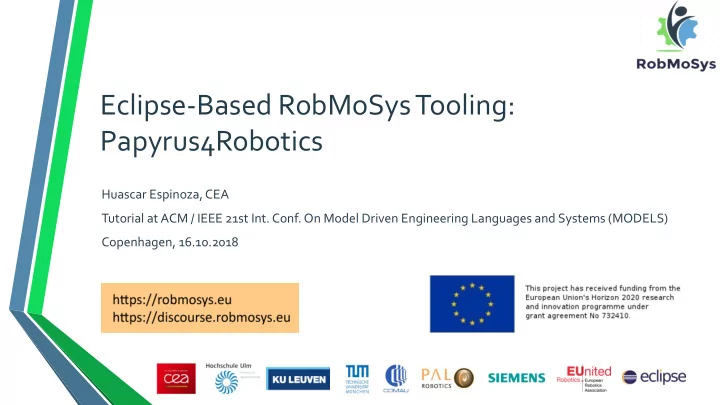

Eclipse-Based RobMoSys Tooling: Papyrus4Robotics Huascar Espinoza, CEA Tutorial at ACM / IEEE 21st Int. Conf. On Model Driven Engineering Languages and Systems (MODELS) Copenhagen, 16.10.2018
Papyrus4Robotics Toolchain
RobMoSys Model-Driven Approach RobMoSys Composition Structures Communication System Component Architecture Functional Architecture Component Definition Behavior Deployment Abstractions Multiple Stakeholders and Concerns Modelling Views Component and Validation and Code Generation and Architectural Design Verification Deployment RobMoSys-related Tools Safety Validation & Component Design Quality Implementation Assessment Verification Management Release
Viewpoints in Papyrus (1/2) Aligned to ISO 42010 RobMoSys (Papyrus) Architecture Framework Stakeholders ( roles ) Separation of Roles Configuration Concerns ( artifacts ) Viewpoints ( diagrams, palettes, menus,… )
Viewpoints in Papyrus (2/2) Viewpoints to be selected Viewpoint-Customized Environment Separation of Roles Deployment
Safety Analysis with RobMoSys
Applicable Safety Standards in Robotics Functional Safety
Why Models for Safety Assessment? If a fault develops here What effect does the fault have? On the outputs System Design Model Credits: Yiannis Papadopoulos, University of Hull, U.K
Safety Analysis with RobMoSys safety engineer component supplier system builder critical path safety engineer Fault Tree Analysis (FTA) View
Safety Analysis Example
Safety Analysis Use Case Scenario Design of a real-time Cartesian impedance controller, in torque mode. Identify the critical faults to be monitored to avoid unintended movements (hazard), that may cause collisions (harm).
Scenario Workflow 2. Component 3. System 4. Critical Path 1. System Modeling Fault Analysis Hazard Analysis Identification
1. System Modeling 2. 3. 4. Define System Architecture: Connectors, component system Service Instantiation, Data exchanged supplier builder Define Components: Ports, Services, Parameters, Activities
1. 2. Component Fault Analysis 3. 4. Associate failure modes to ports, internal safety component engineer supplier failures, propagation links, and barriers It defined the potential fault propagation inside each component
1. 2. 3. System Hazard Analysis 4. Fault Propagation Tree Set to “Top Event” This defines the (high- level) safety requirement: * solver under development “pick & place trajectory speed < 250 mm/s”
1. 2. 3. 4. Critical Path Identification Faults that must be monitored and mitigated
Papyrus4Robotics Roadmap Year 4 Year 1 Year 3 Year 2 Now RobMoSys Profile RobMoSys Editor 1st Release 2nd Release Safety View Safety Analysis Safety Runtime Monitoring 1st Release 2nd Release 3rd Release Code Generation and Simulation Round-trip Engineering 3rd Release 1st Release 2nd Release 01 07 09 03 09 01.02. 30.04. 07 07 Time 2017 2017 2017 2018 2018 2019 2020 2019 2020
Thanks! Questions?
Digital Data Sheet
Ambition of Creating Models Models for run-time dialogues 5 Complexity between machines Models for verification and 4 validation Models for software tools and 3 standards Models for human software 2 documentation Models for human discussions 1 Ecosystem Life
Recommend
More recommend